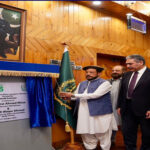[author image=”http://hunzanews.com/wp-content/uploads/2014/01/Ahmad-Zawar.jpg” ]Ahmad Zawar[/author]
Curbing Sectarian Intolerance – A Pakistani version of Islam?
Pakistan is a radicalized society. A country where there are just too many Islamic sects and the level of sectarian tolerance is not very high. We can never deny the fact that there is a general hatred/dislike prevalent in a large number of people in our society towards other sects. Of course the argument for all followers of every religion and sect in the world remains the same and that is ‘we are better than you’ but in a polarized society like Pakistan this has now taken a very ugly form. When taken to an extreme form backed by foreign funding to propagate a certain version of Islam and to minimize a certain influence on us, the result is Lashkar-e-Jhangvi/Sipah-Sahaba and other terrorist organizations who are killing hundreds of innocent people out of sectarian hatred.
The reality in our society remains the same. A shia is an alien to a conservative sunni and a sunni is the violent form of Islam to a shia. We are told not to marry out of sect and are always encouraged to believe on stereotypes when judging a person of another sect. Religion in Pakistan needs a direction! I intend to refrain from criticism of any sorts and just focus on providing some solutions. I know the answer to this problem according to a lot of people is a secular governing of the country but I leave the Secular vs Islamic Pakistan debate for another day. The need for sectarian harmony and religious tolerance is the need of the hour here. While this is always possible at personal level, organized efforts at government level can really work.
The following is what I think can be done to minimize sectarian hate and promote sectarian harmony:
1- Build a Pakistani version of Islam
It may sound absurd but it’s all around us when we look at the Islamic world. I do not intend any innovation in the religion. We all talk about how Saudi Arabia wants their version of Islam implemented and how Iran wants to influence the world with their version. Why not a Pakistani version then? We perhaps have the maximum number of Islamic sects possible in this country. The only version that would solve our problems is the one that tolerates all sects. Pick out scholars from each sect, get them on a table and assign them to single out similarities between sects. Make scholars/maulvis from sects hand in hand with each other, this would send out the message to the people that we all love each other and that we should be tolerant towards one another. The Pakistani version of Islam would mean we need no Saudi Arabia or Iran and would work to make people follow a version that tolerates all sects.
2- Establish the office of Grand Mufti
Countries like Saudi Arabia, Iran and Egypt have this. A religious godfather for the country. This is essential for the points just made above to be implemented. The grand mufti needs to be a person who is way above sectarian divides and of course appointed on the merit of knowledge. The department which the Grand Mufti would head should include representation from all sects of Islam present in Pakistan. The Grand Mufti should be the final authority on religion in political/social matters in the country. Personally people should be free to follow any cleric in the world but the supreme religious authority on matters within Pakistan should lie with the Grand Mufti who would take recommendations from representatives of different sects. The Grand Mufti’s rulings should not be on personal matters but rather on the socio/economic/political problems faced by the country.
3- Control the mosques/pulpit
With the establishment of the office of Grand Mufti and the department he would head, you can move forward to control the hate material being propagated in the mosques in Pakistan. There should be checks and balances on the number of mosques being built and what is being said on the pulpit in those mosques. Sermons should be highly scrutinized and any cleric found propagating sectarian hate should be immediately banned and prosecuted accordingly. The office of the Grand Mufti should set out rules of what should be and what should not be said by clerics in mosques with most emphasis on promoting sectarian harmony and crushing and denouncing sectarian/religious hate. The Grand Mufti’s Friday/Eid prayers’ sermons should take the lead to promote sectarian/religious harmony and mosques around Pakistan should be made to follow the course.
4- Research on religion
The ministry of religious affairs is a waste in Pakistan that only cares about sending people to Hajj and earning some cash. There is no emphasis on holding religious workshops, seminars and conferences that promote academic debate, research and sectarian harmony among sects in the country. Islam in Pakistan needs an academic boost. Just like the Al-AzharUniversity in Cairo or the learning centers in Qom, Iran. There should be more and more research on religion and different sects should come together and take the study of religion academically forward. Education is the only way forward, be it any field and religion is no exception. When education can bring the poor and rich together, bring different cultures together, it would definitely bring different sects together as well.
5- Study of sects in secondary education
There are only two ways of bringing stability to the mess we are in because of religious hate, either ban study of religion or make the teaching more realistic. I would discuss the latter. In school we are taught about one Islam and never introduced to sects, this is misleading. While of course the religion of Islam is one, can you deny the fact that there are so many different sects of Islam in Pakistan? According to me students should be made to learn about different sects, this is same as learning about different cultures, it would instill tolerance and reduce alienation for others. All sects are beautiful and highly researched. Learning a thing or two about a different sect than yours would only help in eradicating misconceptions about other sects. The academics should avoid political Islam debates and concentrate solely on the academic side. I personally benefited so much after I learnt about jurisprudence in different sects of Islam in my study of Islamic Law in LLB. Therefore when we already take the subject Islamiyatso seriously and make it compulsory everywhere, why not teach it more realistically that results in more sectarian tolerance?
While my solutions may not stop terrorists from continuing their atrocities against religious minorities, I believe all of what I mentioned above can help in creating an atmosphere in Pakistan that is full of religious and sectarian tolerance. A Pakistani version of Islam can be the mixture of all sects here and propagated by a state run institute. This can lead to less confusion, more focus on religious research and end the alienation among different sects about one another. This can in long term result in a Pakistan which has no sectarian violence.
“You may say I am a dreamer but I am not the only one” – John Lennon























